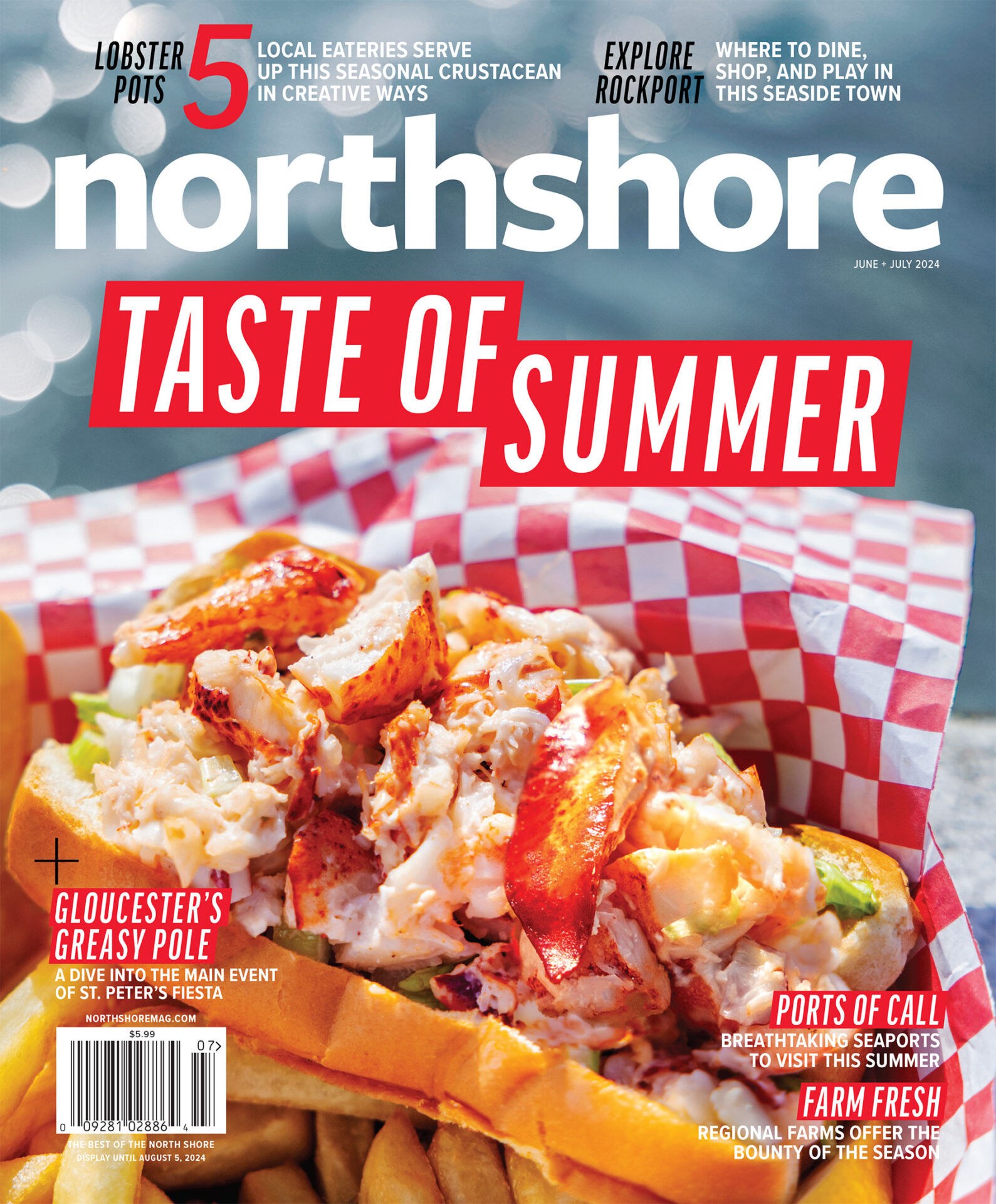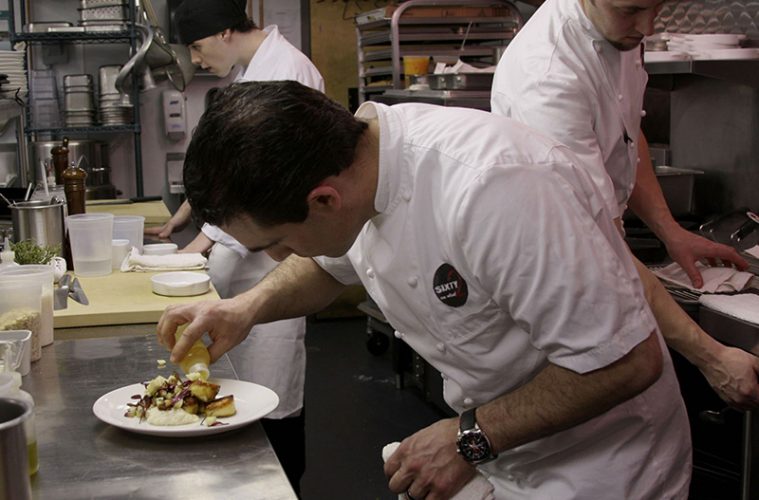Vitello Tonnato—cold braised veal with tuna-infused aioli and capers. It’s not an everyday dish, but it’s not that uncommon, either. It’s something you may have eaten before and forgotten, or that you remembered as nothing particularly special.
But this Vitello Tonnato is different. This is the Vitello Tonnato you’ll always recall as the dish that wiped your mind clear of everything other than itself. It is enticingly chilled, luxuriously tender, lighter than air, and seductively sweet with a sassy tang. This is great food, the kind of food that is never an accident and always from a chef with a glorious gift. One of those chefs is in the kitchen at 62 Restaurant & Wine Bar.
If you stand near the kitchen door, you can catch a glimpse past the blur and bustle of cooks and waiters, flames and steam, to and where Antonio Bettencourt, 36-year-old chef and owner, performs his art. Bettencourt and his general manager and wife, Valerie, opened the restaurant three years ago and haven’t had a moment to look back since.
Back then, Bettencourt was virtually unknown, except in a small circle of other chefs and restaurateurs. Now, he’s one of the most praised chefs on the North Shore. Growing up in Peabody, the youngest of five and the only son, it was nonetheless Bettencourt who helped out in the kitchen when mom cooked suppers and Sunday dinners. Recipes recalled family roots from Brazil and Portugal, and Bettencourt watched the way his mother prepped and cooked, just as he absorbed the musings and techniques of Julia Child on television. Still, he never thought he’d grow up to be a chef someday.
Of course, some things happen that plainly foretell the future, although no one seems to realize it at the time. For example, there’s the ski trip Bettencourt and his high school classmates took to Quebec. Some of the kids, feeling free of parents’ watchful eyes, brought contraband cigarettes, but Bettencourt brought a roast, which he cooked and served in the condo he was sharing with his grateful friends. Or the fact that Antonio and a high school buddy experimented with recipes in their moms’ kitchens while other guys played sports and watched TV. Still no “a-ha” moment, no “I want to become a chef” epiphany. Clearly, food had Bettencourt’s attention, but it had yet to capture his ambition.
After high school, Bettencourt spent a year in military school, which he found challenging and invigorating (“I liked the discipline,” he says), but ultimately boring. Soon, he was hauling safes and vending machines in the back of a truck. Next, he was driving a Pastene Company truck, delivering food to restaurants. This got him rubbing elbows with the restaurant business, but more importantly, it got him home each day by noon. And that was the turning point. “I was in my early 20s. I had to cook for myself, but I also found myself cooking for pleasure and experimenting rather than just cooking to eat,” Bettencourt says. “Driving the truck was the perfect job for me because it gave me plenty of time to cook.”
Before long, Bettencourt found himself catering parties and teaching others how to cook. He took on his first job, a wedding for 200 guests, entirely by himself. Obviously, nobody told Bettencourt it couldn’t be done, so he just did it.
“At that point I realized I would not escape this, nor did I want to,” Bettencourt says. “Catering took off to the point where I knew I was at the crossroads of deciding where I wanted to go. I decided I wanted the restaurant lifestyle. I like the adrenaline rush.”
From there, Bettencourt enrolled at Cambridge School of Culinary Arts, where he excelled. “I couldn’t have been more into it. For the first time in my life, I got great grades,” he says. It’s also where he met his first mentor, Roberta Dowling, the school’s founder, president, and executive chef. “[Dowling] took me under her wing and taught me about the palate, and pushed me to take seasoning to the limits. I was hungry for that knowledge.”
In what would be a fateful gesture, Dowling introduced the newly minted, still-nascent chef Bettencourt to notable chef Amanda Lydon, who, on Dowling’s recommendation, hired Bettencourt as a line cook at Metro Brasserie in Cambridge. It was business as usual for Bettencourt at the Cambridge eatery until Lyons, along with much of her kitchen staff, left for UpStairs on the Square. Bettencourt, left behind at Metro, endured a virtual trial by fire as executive chef, working 18 hours a day, seven days a week. “I learned a lot in short period of time,” he says.
Not long after her move, however, Lydon invited Bettencourt to cook at UpStairs, an offer he promptly accepted and that would lead to even bigger opportunities. Lydon soon made Bettencourt sous chef at the Soiree Room, the upstairs dining room at UpStairs. Meanwhile, James Beard Foundation award-winning chef Susan Regis (of Lydia Shire’s fabled Biba) admired Bettencourt’s performance, enough so to also make him sous chef of UpStairs’ lower-level dining room, The Monday Club Bar.
“I’ve been lucky to work for so many great people,” Bettencourt says. Likely among them is Lorenzo Savona, former partner in Boston’s landmark Les Zygomates, who was planning an upscale Italian restaurant in an unlikely location and wanted Bettencourt to help design, staff, and run the kitchen as executive chef. Bettencourt jumped on board with zeal, helping to transform Savona’s vision into Tomasso Trattoria, the ambitious and widely acclaimed authentic Italian restaurant in Southborough. Bettencourt was suddenly playing in the big leagues and enjoying it more and more each day.
When he assumed additional duties at Panzano Provista e Vino, the Italian food shop next door to and owned by Tomasso, he once again found himself biting off more than most other people could chew. There, he was responsible for the pastas, sauces, prepared foods, and sandwiches set out in retail displays, an assignment that simply did not suit his personality. “I don’t like retail. I need to be cooking in a restaurant kitchen,” Bettencourt says. “I crave the pressure, the stress, the physicality. I love it when I’ve worked as hard as I know how to, and at the end of the night, I leave everything I have in the kitchen.”
If pressure was what Bettencourt sought, his wish came true in February 2008, when he and Valerie opened their own restaurant, first called Sixty2 on Wharf and recently changed to 62 Restaurant & Wine Bar. It was not necessarily the dream of a lifetime, as he was, at first, a reluctant convert to professional cooking and had been at it for less than 10 years. But it was certainly the next preordained step forward for an ambitious and accomplished young chef in the midst of a whirlwind career—one fueled by a devotion to hard work and professional discipline.
When Bettencourt reflects on his year in military school, he recalls that the discipline he learned and relished there aligned with his approach to every aspect of the restaurant business. Developing recipes, running a kitchen, cooking every day, and operating a business demand a disciplined approach, he says. “The discipline in cooking is to stop thinking and execute as you have been taught. That way you can, for example, bang out the toffee pudding and it will be right every time. This is what I teach my chefs.”
But discipline is not an end in itself. For Bettencourt, it is a way to ensure that a passion—one that he believes should be felt equally by the kitchen and wait staff–for his food is evident on every plate the restaurant serves. “And then the customer will see and taste that passion on the plate.” he says. To Bettencourt, passion and discipline aren’t opposites, but rather two sides of the same coin.
The dishes that emerge from his kitchen are earthy, authentic, and sensual. Yet at the same time, they are precise, studied, and perfected. It seems as though Bettencourt’s real purpose as a chef is to take the best of the Mediterranean table and have the last word on how perfectly it can—and should—be prepared.
First, deep-fried cauliflower, currants, pine nuts, and a red wine agrodolce. Next, the braised beef short rib ravioli, San Marzano tomato, and Parmesan cheese. For secondi, roasted pork chop with Bosc pear and cranberry mostarda and broccoli rabe. Order this simple meal and you will taste first-hand how Bettencourt combines ingredients in ways that keep each taste distinct yet in harmony with others; the way he and his cooks lavish respect and refined technique on quality ingredients, from local growers and vendors as often as possible. As expected, the kitchen bakes all the bread, makes all the desserts, and produces its own mortadella, which tastes half a world away from the bland deli version with the same name. But whatever you do, don’t miss the Vitello Tonnato.

